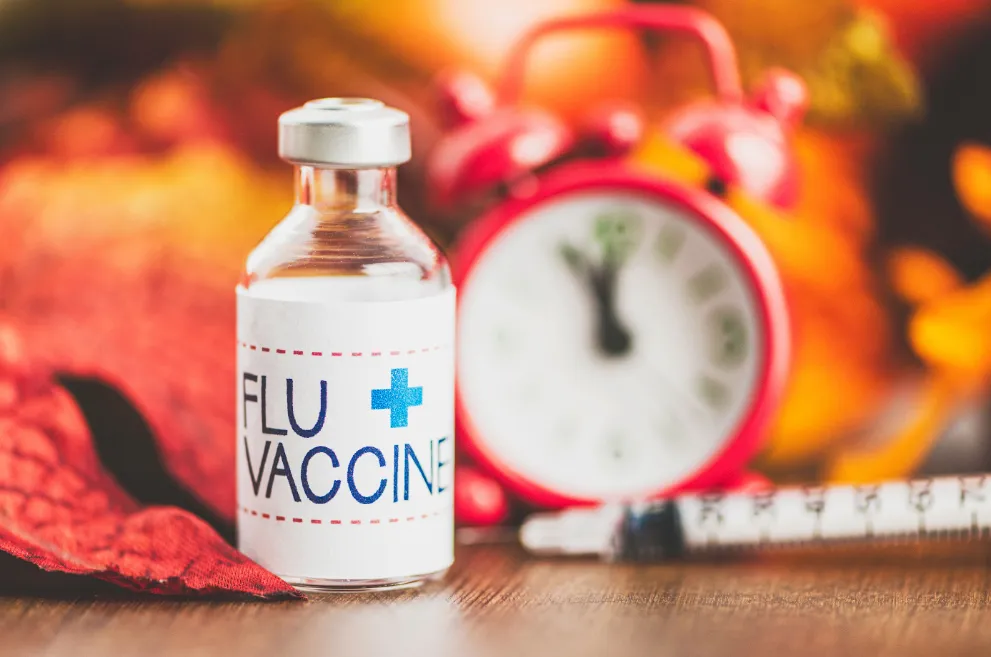Who should get a flu shot?
The flu shot is recommended for everyone aged 6 months and above. It is even more crucial for people at a higher risk of complications from the condition. These people include young children, pregnant women, older adults, and people with chronic conditions such as asthma.
When is the best time for a flu shot?
The CDC recommends getting your flu shot by the end of October. This is because it can take your body up to two weeks to develop immunity to the virus after vaccination. Getting the flu shot by the end of October will allow your body to develop immunity against flu cases that typically start by October, peaking in December, January, February, and sometimes March.
Getting your flu shot earlier than September or October is not advisable. Research shows that the effectiveness of the vaccine to help you fight off the flu decreases by 6% - 11% per month. If you get your vaccine earlier than recommended, you may not have enough immunity to protect you from influenza when flu season peaks.
Why are children exempted from the early vaccination rule?
The recommendation that adults avoid getting their flu shot earlier than September or October does not apply to children. It is because children require a two shot series with the second dose being given four weeks after the first. Therefore, children can get their first shot as soon as the vaccine is available, even as early as July or August.
Who else can get the flu shot early?
Early flu vaccination is also recommended for pregnant women in their third trimester to help protect babies during their first few months of life.
Why are some people reluctant to get flu shots?
Some people hold the inaccurate belief that the flu shot isn't effective and thus are reluctant to get vaccinated. However, according to the CDC, flu shots have prevented 7.5 million flu illnesses, 3.7 million medical visits, 105,000 influenza hospitalizations, and 6,300 flu-associated deaths. The flu shot remains the most effective way to avoid serious complications or death from the flu.
Is it too late to get a flu shot?
It isn't too late to get a flu shot as long as the flu virus is still circulating. Though flu season peaks in December, January, February, and sometimes March, the flu virus can be in circulation for more months than expected. The protection you get from the late flu shot is better than no protection at all.
Should I still get the flu shot if I've already been exposed?
Yes, it is advisable to still get vaccinated even if you've been exposed. This is because you are most likely to have gotten sick and recovered from a single strain of the influenza virus. The flu shot is a combination of multiple strains that account for most seasonal flu. Getting a flu shot will give you immunity against the strains to which you haven’t been exposed.
Are there contraindications to the flu shot?
Though flu shots are safe and effective for most people, certain people should not get them. The flu shot is contraindicated in babies younger than 6 months and people with a severe allergy to any component of the vaccine. The nasal spray flu vaccine is contraindicated in pregnant women and immunocompromised people. Also, a high-dose inactivated vaccine is not approved for use in those younger than 65.
Where can I get a flu shot?
You can get flu vaccines approved for use in the United States in most of these places:
- pharmacies
- doctor’s offices
- student health clinics
- local health departments
- urgent care centers
Which flu vaccine is the most effective 2022-2023 flu season?
All the approved flu vaccines are effective. However, many factors will determine the most suitable for you. To learn about the available vaccines, see these guides to choosing the most effective flu vaccine for the 2022-2023 flu season.
How much does a flu shot cost?
The cost of a flu shot may be free or discounted depending on your insurance coverage. However, if you have to pay full price, it may cost you as much as $96.10 or even more. But with a free RxLess discount card, you can get up to an 88% discount in most pharmacies, including CVS, Walgreens, and Rite Aid.
















